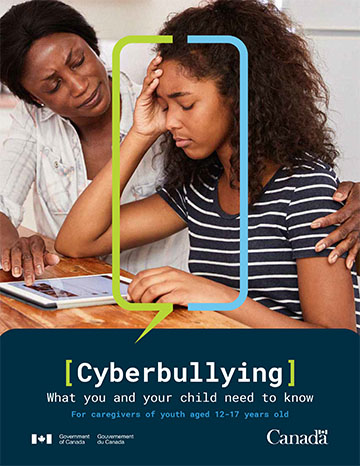Booklet for teachers and parents of kids aged 12-17
Cyberbullying: What you and your child need to know
For caregivers of youth aged 12-17 years old
What your child needs to know
Whether they learn it in school or at home, your child should know about three main topics:
- Cyberbullying
- Online reputation
- Sexting and sextortion
What is cyberbullying?
Teenagers spend a lot of time online. Many teens are active on social media, have formed online habits, and may be exploring relationships and sexuality online.
Your child may encounter cyberbullying: being teased, hurt or embarrassed by someone online. You can help by teaching your child to practice online safety, and to understand the consequences of cyberbullying.
Nearly 3 in 4 parents say cyberbullying stopped after they took action.
Source: Cyberbullying Public Awareness Research, Environics Research Group, 2019.
What is an online reputation?
As your child spends time online, they begin to build an online reputation. Others’ opinions of them are shaped by their online behaviour, including the sites and apps they use and what they post or share. While a positive online reputation can benefit your child, a negative one can damage their relationships, open the door to cyberbullying or limit their future opportunities.
What is sexting?
Sexting is when your child creates, sends or shares sexual messages, images or videos with friends, people they know or even strangers online. They may think it is harmless, especially with their boyfriend or girlfriend, but they should know that once an image is sent it is out of their control. In the wrong hands, these images can end up hurting them or someone else.
What is sextortion?
Sextortion (sex extortion) is a type of blackmail where someone threatens to send a sexual image or video of your child to friends, family or other people if they don’t pay them, provide more sexual content or do what they ask.
If your child has shared sexual images of themselves online, you can get help removing them from the internet at NeedHelpNow.ca
3 in 10 youth say they’ve been cyberbullied
Source: Cyberbullying Public Awareness Research, Environics Research Group, 2019.
If you think your child is being cyberbullied
If you suspect your child is being cyberbullied, there are things you can do to help. Keep communication open, watch for changes in your child’s behaviour, and be ready to support them and take action when the situation calls for it.
What can I look out for?
- Changes in time spent online
- Being more secretive about online activities
- Appearing sad, frustrated, impatient or angry more than usual
- Having trouble sleeping or eating
- Avoiding or performing worse in school, activities and social situations
- In extreme cases, suicidal thoughts and self-harm
What can I do?
- Talk with your child about cyberbullying
- Listen calmly
- Support and reassure them
- Learn the extent of the bullying
- Tell your child not to respond to cyberbullying messages
- Ask your child to block or break off contact with the bully
- Document the incident
- Report it to your child’s school, Internet Service Providers and/or social media sites, and the police as appropriate
- Help them deal with any sexual images posted online at NeedHelpNow.ca
- Reach out for mental health support
If you think your child is cyberbullying others
If you suspect or learn that your child is involved in cyberbullying others, it’s important to focus on your child’s actions, ensure they understand the seriousness of the issue and be there for them as you deal with it together.
What can I look out for?
- Many social media accounts on multiple sites
- Insults, snarky remarks or sarcastic laughter while online or texting
- More secretive about online activities
- Spend long hours online, almost obsessively
- Have friends who behave in ways that are mean or uncaring
- Don’t seem to care if their words or actions hurt others
What can I do?
- Talk with your child about cyberbullying
- Stay calm and find out what has occurred
- Reinforce that cyberbullying is unacceptable
- Try to understand why they are cyberbullying
- Help them understand the seriousness of their actions and potential consequences including legal repercussions
- Limit and monitor their online time
- Encourage your child to remove bullying content
- Encourage an apology if it would be sincere
- Cooperate with authorities who may become involved and work toward a solution
Resources for caregivers
For more information on cyberbullying, sexting and sextortion, you can access these resources:
Kids Help Phone
Talk to someone at Kids Help Phone—a free, 24/7 confidential counselling, information and referrals, and support service for young people.
KidsHelpPhone.ca
Text: 686868
Call: 1-800-668-6868
Cybertip.ca
Canada's tip line for reporting the online sexual exploitation of children and access to Internet Safety Information for Youth designed for parents and educators.
NeedHelpNow.ca
NeedHelpNow.ca helps teens stop the spread of sexual picture or videos and provides support to youth.
#StopCyberbullying
